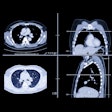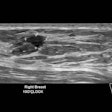
The investigation into the work of two senior Italian radiologists looks set to continue after an autopsy on Andrea Purgatori, a well-known crime journalist and screenwriter, has shown there were no brain metastases at the time of death, according to reports in the national media.
Prof. Gianfranco Gualdi, director of emergency radiology at the Umberto I Hospital in Rome and a full professor of emergency radiology at La Sapienza University of Rome, and his neuroradiologist colleague, Dr. Claudio Di Biasi, are being investigated after a possible misdiagnosis that might have contributed to Purgatori's death, as reported by AuntMinnieEurope.com on 25 July. Gualdi has also been a consultant Vatican radiologist since 1981.
On Wednesday, 27 September, a meeting took place between staff from the Rome prosecutor's office and forensic medicine specialists from the Tor Vergata Polyclinic, led by Prof. Luigi Marsella, noted an article on the Corriere.it news website. Marsella's team has conducted a series of histology tests over the past few weeks.
The investigation began on 22 July after the prosecutor received a complaint from the Purgatori family about the work of the two radiologists. The aim was to determine the true cause of the journalist's death. The opinion of Gualdi and Di Biasi "was in open conflict with the tests carried out by other specialists and in particular by Prof. Alessandro Bozzao of La Sapienza," Corriere.it reported.
A second opinion contradicted the first diagnosis made by Gualdi and Di Biasi of a tumor with brain metastases, claiming that instead there was evidence of cerebral ischemia. The main issue is whether Purgatori was subjected to an erroneous therapy and whether this affected his life expectancy, the website said.
"It will now be necessary to establish whether the therapies eliminated the metastases or whether there was an incorrect diagnosis and therefore a harmful treatment," stated the article, adding that the Purgatori family has noted the absence of brain metastases in Andrea Purgatori and "continues to trust in the work of the judiciary, with the sole intention of having the truth of the events and any responsibilities ascertained."
Doubt remains
The autopsy results spell trouble for the doctors, but doubt remains about whether the use of radiotherapy had any influence on the patient's death, La Stampa reported on 28 September.
"The metastatic cells may have disappeared due to the radiotherapy he underwent or may never have been there," stated an article in La Repubblica, a leading daily newspaper.
The death of Andrea Purgatori continues to cause discussion, especially after the histology tests, noted a report in RadioRoma.it. The Rome prosecutor's office is now evaluating the request for a hearing to discuss the evidence. The autopsy result does not rule out the possibility that "the presumed metastases" may have gone away because of the "massive chemotherapy-based treatments to which Purgatori had been subjected."
Other juridical steps will follow to further investigate how the radiotherapy impacted Purgatori's death, a source told AuntMinnieEurope.com on 28 September. "But probably it will require time ... as is typical for this kind of investigation in Italy, unfortunately."
Another observer disagreed, however. "I think the investigation will stop here," the source said, adding that the media may try to emphasize that the investigation will continue, even though there is poor evidence against the doctors.



















